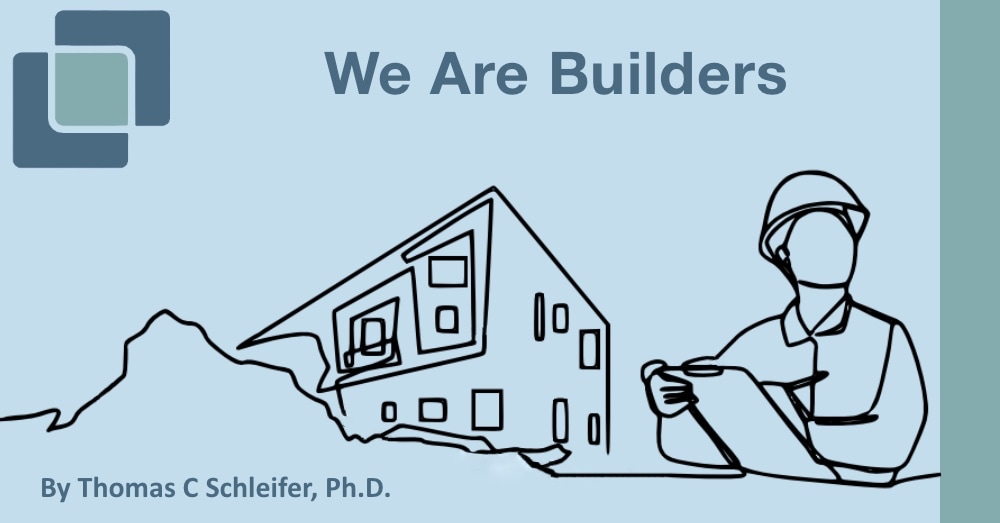
If you say “contracting” to anyone they immediately think of “construction”. The “building” industry has become identified with the signing of a contract at the point of sale. “Builders” have become “contractors” in the eyes of the public. This misidentification has become so prevalent that even “builders” now see themselves as “contractors”. It’s something like “cola” and “Coke”.
We Are Not “Contractors”
Builders are not contractors. They contract to do business, but crafting contracts is not their business. Construction expertise is their business. Starting from scratch, professional builders assemble a team of construction specialists that over time earn a reputation for excellence in a specific segment of construction. Some specialize in hospitals while others build factories or shopping centers and still others provide plumbing, painting, or planting, etc. You have road builders, bridge builders, and those that build only tunnels. Collectively, they are responsible for the worldwide built environment. No small accomplishment.
Contractors
Too many builders are constantly at risk of sudden failure. It is my mission to lower this percentage by teaching construction professionals to recognize risk and manage or mitigate it. The great majority of builders are not financially unstable because they lack construction competence, but because the construction industry has slipped into a business model that stacks the deck in favor of the owners to the detriment of the builders. No other industry requires the signing of a legally binding performance contract based on a best guess of uncertain conditions into the distant future. That is, however, exactly what builders are obliged to do and have been doing for so long that they now see themselves as people who sign contracts – “contractors”.
Misallocation of Risk
- Performance contracts do nothing more than assign risk. In the construction business, they remove the risk from the owner of the asset (where it belongs) and place it squarely on the builder (who is only providing a service and is not a partner in the asset).
- To add insult to injury owners, realizing that builders rarely have the robust capital required to underwrite such enormous risk, demand that builders ensure the owners against any financial risk the asset may represent. Builders are required to bond against failing to deliver the owner’s asset.
- Few ever asked why a builder would fail to complete a project. The answer, of course, is the builder could run out of money. Where does the money needed come from? From the project owner, of course.
- The construction business model has become so twisted that the owner requires the builder to insure/bond against the possibility that the owner won’t adequately pay the builder or pay the builder on time to complete the owner’s project.
- The construction industry as it is structured now assigns 100% of the financial risk to the builder rather than to the owner who initiated the project, owns and benefits from it, and should be held responsible to pay for it.
Absurd
The above scenario is absurd. No one would accept all the financial risk for somebody else’s asset. That would be like buying homeowner’s insurance on somebody else’s home. But if you take a step back and think about it for a minute, that’s exactly what builders have been doing for the past 100 years. That’s how “builders” became “contractors”. This erroneous self-image is the primary reason why so many contractors constantly linger on the edge of financial failure. The business model they follow assigns them unmanageable risk every time they sign a legally binding performance contract.
Reality Check
Construction professionals have often argued that I paint a bleak picture of our business. They also say, “This is the business we are in and we must figure out how to make it work”. I agree. In fact, it has been my sole mission for the past forty years to help construction professionals recognize financial risk in advance and to mitigate it to the extent possible. Construction business management is not about managing building activity but rather about managing the substantial, and (in my view) unreasonable, risk that builders have gradually come to accept as the nature of our business.
Next Week
Next week we’ll take a close look at how to mitigate risk in the reality of a “low bid model” of acquiring new business.
For a deeper look into risk management, read more here: RISK
For a broader view into business failure, read more here: FAILURE
To receive the free, weekly Construction Messages, ask questions, or make comments, contact me at research@simplarfoundation.org
Please circulate this widely. It will benefit your constituents. This research is continuous and includes new information weekly as it becomes available. Thank you.


